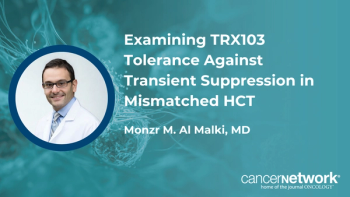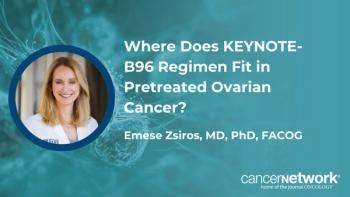
Inherited GATA3 Variant rs38245662 Influences Response to Treatment in Childhood ALL
The inherited GATA3 variant rs3824662 was found to strongly influence response to remission induction therapy in childhood acute lymphoblastic leukemia and was also associated with relapse.
A study published in the Journal of the National Cancer Institute found that the inherited GATA3 variant rs3824662 strongly influences response to remission induction therapy in childhood acute lymphoblastic leukemia (ALL) and is also associated with relapse.1
“We know there is substantial variability in the way patients respond to ALL therapy. Certain mutations in leukemia cells are associated with drug response, but they certainly do not explain the full spectrum of the observed variability,” corresponding author Jun J. Yang, PhD, of St. Jude Pharmaceutical Sciences and Oncology, said in a press release.2 “This is when we realize we need to look at inherited genetic variants as well.”
Using the Children’s Oncology Group (COG) AALL0232 trial for high-risk B-ALL, researchers performed a genome-wide association study (GWAS) on 2597 children. The association between genotype and end-of-induction minimal residual disease (MRD) levels was assessed for 863,370 single nucleotide polymorphisms (SNPs), adjusting for genetic ancestry and treatment strata.
The top variants identified were further evaluated in a validation cohort of 491 patients from the COG P9905/6 ALL trials. Additionally, the independent prognostic value of SNPs was determined in multivariable analyses.
A genome-wide significant association at the GATA3 locus (rs3824662, OR = 1.58, 95% CI = 1.35 to 1.84, P = 1.15 × 10-8 as a dichotomous variable) was identified in the discovery GWAS. Further, this association was replicated in the validation cohort (P = .003, MRD as a dichotomous variable).
After adjusting for age, white blood cell count, and leukemia DNA index, the rs3824662 risk allele independently predicted ALL relapse (P = .04 and .007 in the discovery and validation cohort, respectively) and remained prognostic when the analyses were restricted to patients deemed to be MRD-negative (P = .04 and .03 for the discovery and validation cohorts, respectively).
“This variant isn’t completely new to us; we’ve previously found it to be associated with susceptibility to Philadelphia chromosome-like ALL, a rare but high-risk subtype,” Yang explained. “These new findings about the relationship between the GATA3 variant and MRD solidify the potential utility of inherited variants in how we assess newly diagnosed patients for risk-stratified therapy.”
Importantly, a limitation of the study highlighted by researchers is that only a minority of patients (approximately 25%) had both comprehensive somatic and germline genomic data available. Therefore, with the currently limited sample size, this study was not powered to draw definitive conclusions about how the association of Ph-like ALL and GATA3 SNP influences MRD. However, this limitation could be overcome in future studies of larger cohorts for which somatic profiling is performed.
“These findings may be of value in ALL risk stratification and warrant further mechanistic study to understand the role of GATA3 in determining treatment resistance in pediatric ALL,” the authors concluded.
References:
1. Zhang H, Liu AP, Devidas M, et al. Association of GATA3 polymorphisms with minimal residual disease and relapse risk in childhood acute lymphoblastic leukemia. Journal of the National Cancer Institute. doi: 10.1093/jnci/djaa138
2. Inherited genetic variant influences response to leukemia treatment for some children [news release]. St. Jude Children’s Research Hospital. Published September 11, 2020. Accessed September 25, 2020. https://www.newswise.com/articles/inherited-genetic-variant-influences-response-to-leukemia-treatment-for-some-children?sc=mwhr&xy=10024642
Newsletter
Stay up to date on recent advances in the multidisciplinary approach to cancer.










































